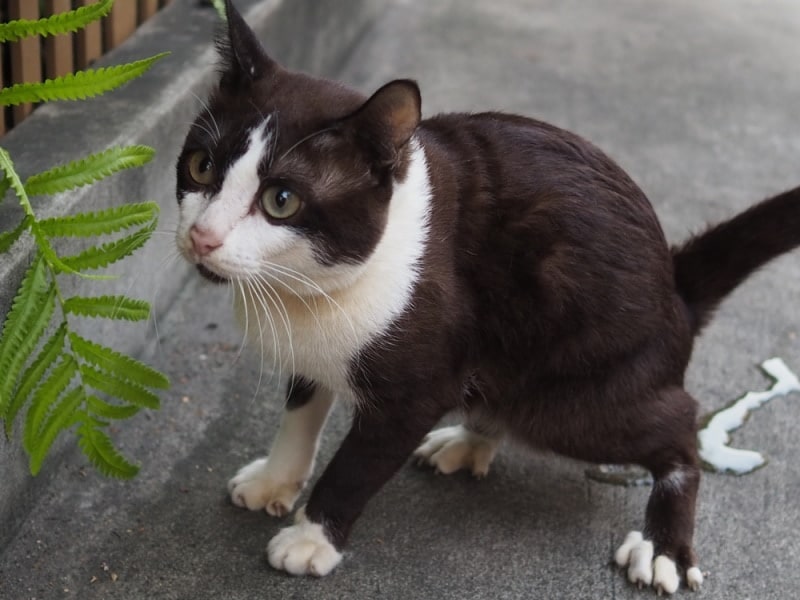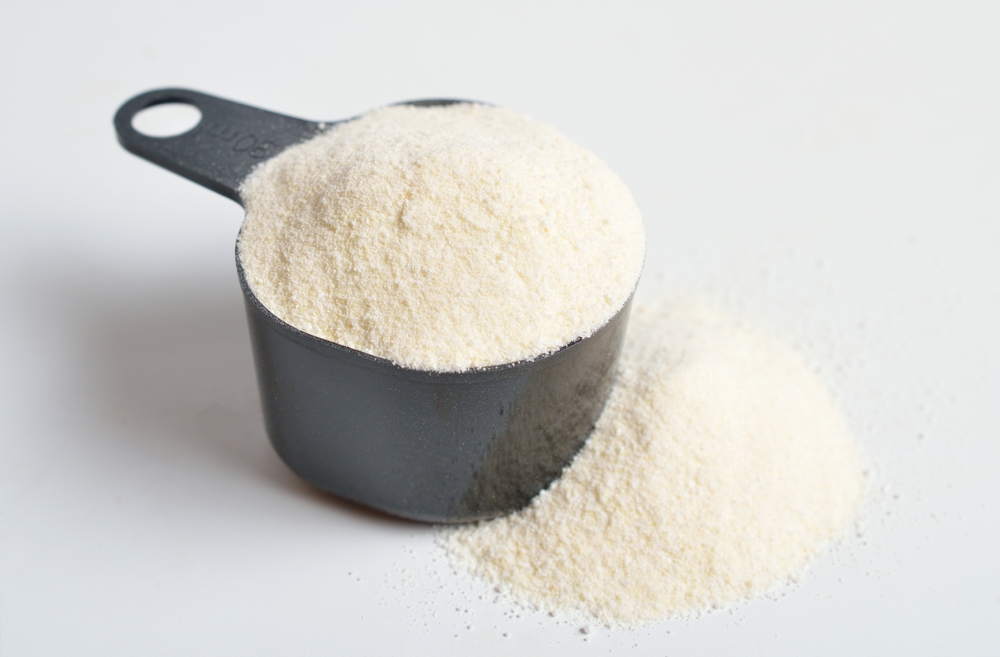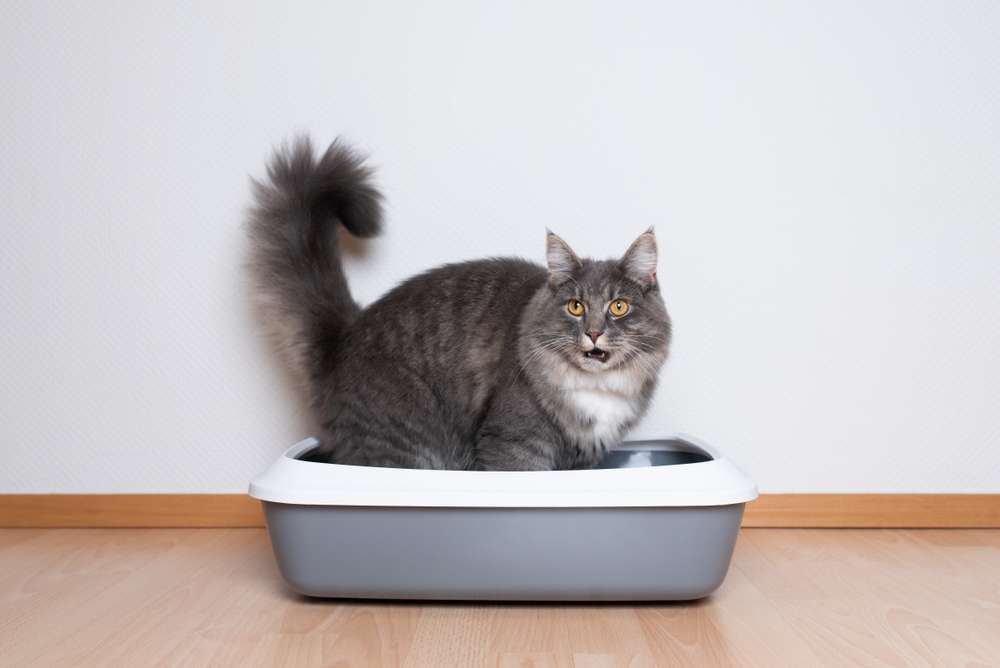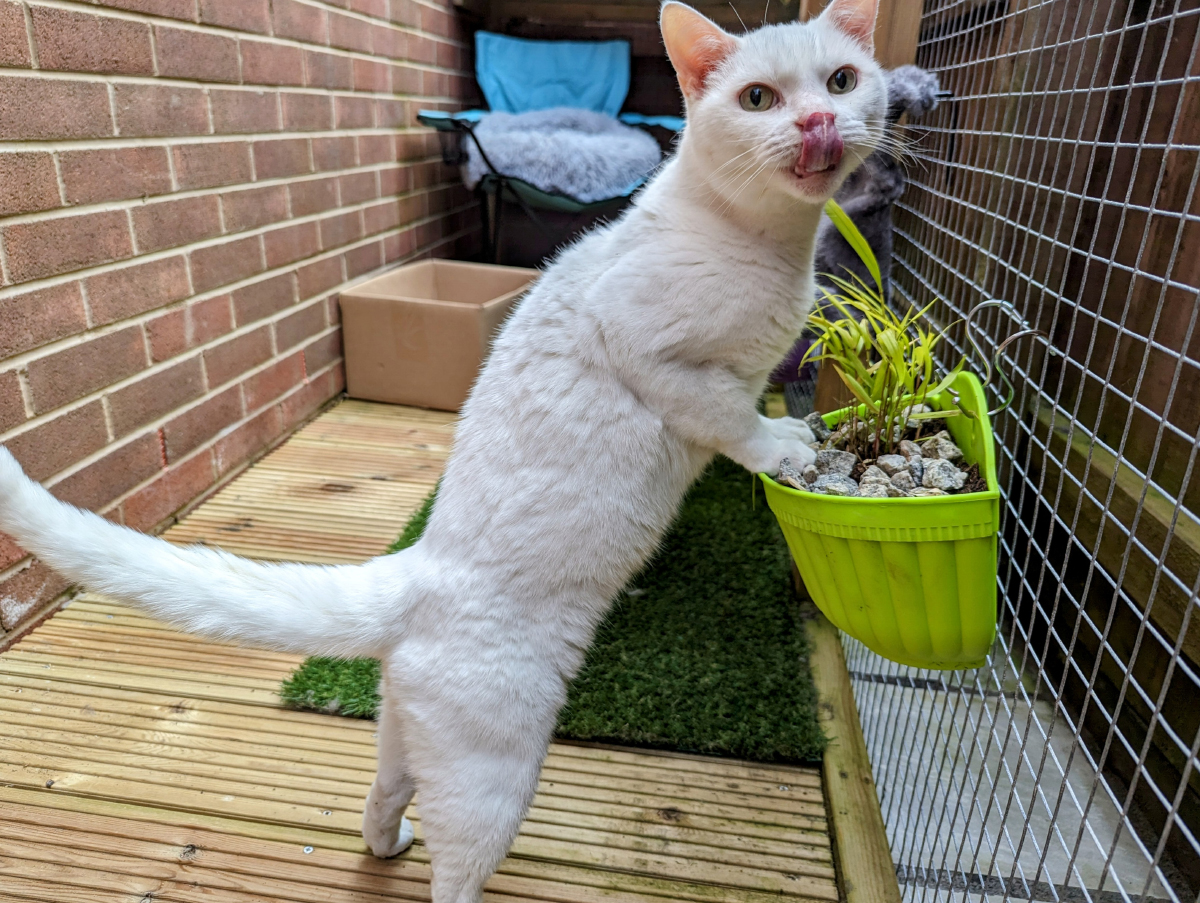Urinary tract infections, or UTIs, occur when the body’s innate defenses are defeated, and microbes invade and infect the organs responsible for creating and storing urine. The urinary tract is a complex system, and a lot of things can go slightly wrong, so urinary tract infections are common.
Almost all UTIs in cats are caused by bacteria. When given the opportunity, these bacteria invade the urinary system by multiplying in both the urine and the mucosal walls of the tract itself. From there, the bacteria either continue to multiply in the same spot or spread along the tract.

Anatomy Review
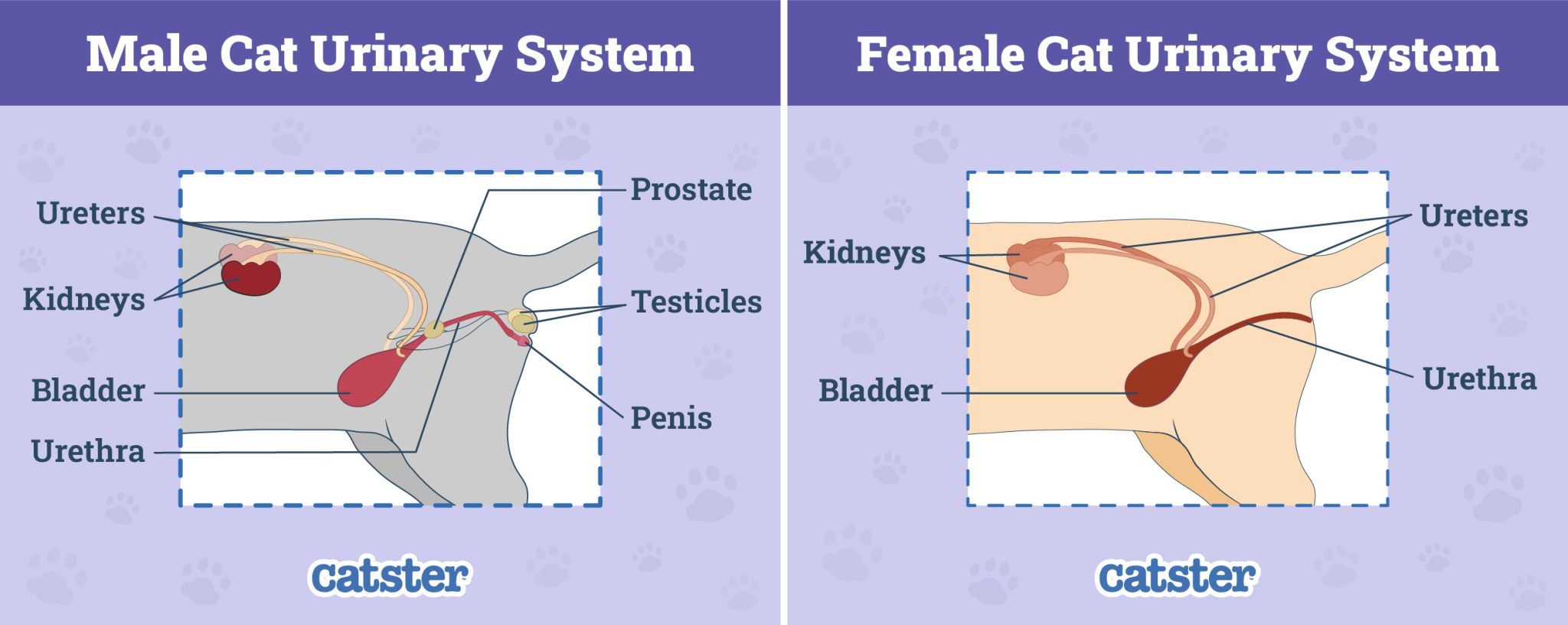
The urinary tract starts at the kidneys, organs where the blood is filtered and urine is created. The urine then travels along a tube-like structure called the ureter to the bladder. And from the bladder, it flows along another tube called the urethra.
Bacteria That Cause UTIs
Most UTIs are caused by only one type of bacteria, as opposed to two or three species of bacteria, for example. Escherichia coli is the most common, but almost any type of bacteria can invade.
- Other gram-positive cocci
- Proteus spp.
- Klebsiella spp.
- Pasteurella spp.
- Pseudomonas spp.
- Corynebacterium spp.

Types of UTIs
When bacteria invade, they can infect the entire urinary tract or singular parts of it.
Lower Urinary Tract Infections
Most UTIs are caused by what is called ascending tract infections—bacteria invade from the outside, up through the urethra, and into the bladder. Many times, the infection stops there, and it is classified as a lower urinary tract infection.
Some cats can deal with a mild lower urinary tract infection for a long time and are very good at hiding it. Therefore, it is actually good to watch your cat use the bathroom and know what is normal for them. That way, when even the smallest thing goes wrong, you will notice.
- More frequent urination
- Straining to urinate
- Urinating in strange places
- Red or blood-stained urine
- Painful urination
If your pet is showing these signs, we suggest you speak to a vet.
If you need to speak with a vet but can't get to one, head over to PangoVet. It's an online service where you can talk to a vet online and get the advice you need for your pet — all at an affordable price!

Upper Urinary Tract Infections
Upper UTIs are almost always clinically worse than lower UTIs and need to be treated by a veterinarian immediately. The kidneys are responsible for filtering the blood and turning it into urine, so infection in these organs can quickly affect the rest of the body.
Plus, most upper urinary tract infections include the lower urinary system because the ascending bacteria have traveled up from the bladder and into the kidneys. If bacteria has come into the kidneys from upstream, from the blood, then the overall situation is severe indeed.
- Lethargy
- Pain in the abdomen
- Vomiting
- Inappetance
- Painful urination
How Bacteria Invade
The urinary tract is designed to defend itself; however, when something changes, even slightly, it is easier for bacteria to invade. Many features of the system work together innately to prevent infection.
- Concentration: Normal cat urine is very concentrated, which creates an environment that is difficult for bacteria to grow. But if that changes for long periods, as can sometimes happen with chronic disease, bacteria can overgrow. For example, the disease hyperadrenocorticism changes the concentration of urine through the dysregulation of hormones that control salt and water in the body. Chronic kidney disease also dilutes the urine. Hence, UTIs are common with chronic diseases.
- Composition: Some diseases change the molecules in the urine. Diabetes (a common disease in cats) forces excess glucose from the blood into the urine, which creates an ideal sugary environment for bacteria to prosper.
- Flow velocity: Healthy pee that flows quickly and strongly through the urethra keeps most of the bacteria sitting on the genitals from traveling up the urethra. However, if urine dribbles out slowly or is not completely voided, bacteria can creep up the urethra. Many cats, especially older cats, that are incontinent or who do not urinate as powerfully as they used to are predisposed to UTIs.
- Structural Compromise: Likewise, changes to the structure of the tube-like urethra can allow a breach of the system, like sphincters do not close tightly, or the urethra is deformed, has a polyp, is overly stretched out, or even if it is too short. Cats that have had lower urinary tract problems before are predisposed to having them again because even tiny scars along the urethra breach the barrier. Even structures that are outside the urethra can impact its effectiveness. The prostate, for example, can get enlarged and press on the urethra, thus deforming its seal.
- Immune Suppression: Generalized immune suppression can also inhibit the urinary system’s ability to prevent UTIs. When the immune system is suppressed, antibodies and white blood cells decrease, and bacteria are not killed off as quickly. This commonly happens with chemotherapy or FeLV; both decrease the efficiency of the immune system and predispose cats to UTIs.
- Medication: Certain medications also can change the consistency of urine and predispose a cat to a UTI. Corticosteroids are commonly given to cats and have a side-effect that increases dilute urine production and, consequently, UTIs.
- Incontinence: Incontinence deserves another mention not only because it is so prevalent and problematic but because it can be both the cause and the effect. If a cat is incontinent, the dribbling urine creates a perfect pathway for bacteria to travel up. But also, if a cat has a UTI, the walls of the tract become inflamed, and the sphincters do not close properly, dribbling urine.
Therefore, incontinence can both cause a UTI and be caused by a UTI. Sometimes it can be difficult to puzzle out which one came first.
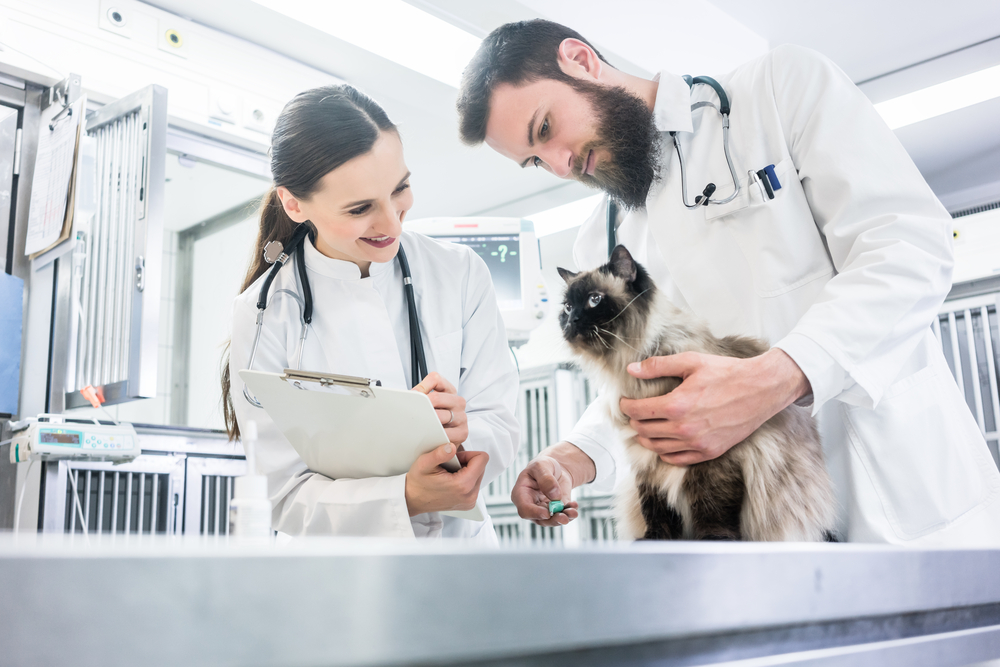
The Problematic Indoor Cat
Indoor cats are prone to UTIs. The reasons for this are complex and multi-faceted. But inactivity, decreased water consumption, decreased urination frequency, and chronic stress all play a role.
In fact, there is a whole lower urinary tract syndrome, which probably deserves its own article, that predisposes cats to UTIs. The syndrome is called Feline Lower Urinary Tract Disease (FLUTD), and cats can end up not being able to pee at all. This is an urgent emergency!
A good strong pee flow, with lots of urine flushing out the system, acts as its own defense against UTIs. There are several things that we can do to help encourage cats to keep their urinary system moving along. The main goal is to encourage cats to drink water and, as a result, to urinate more frequently and not to hold their pee for long periods of time.
- Increase the number of water bowls
- Ensure fresh water always
- Try a cat water fountain
- Reduce fighting over water bowls
- Add water to food
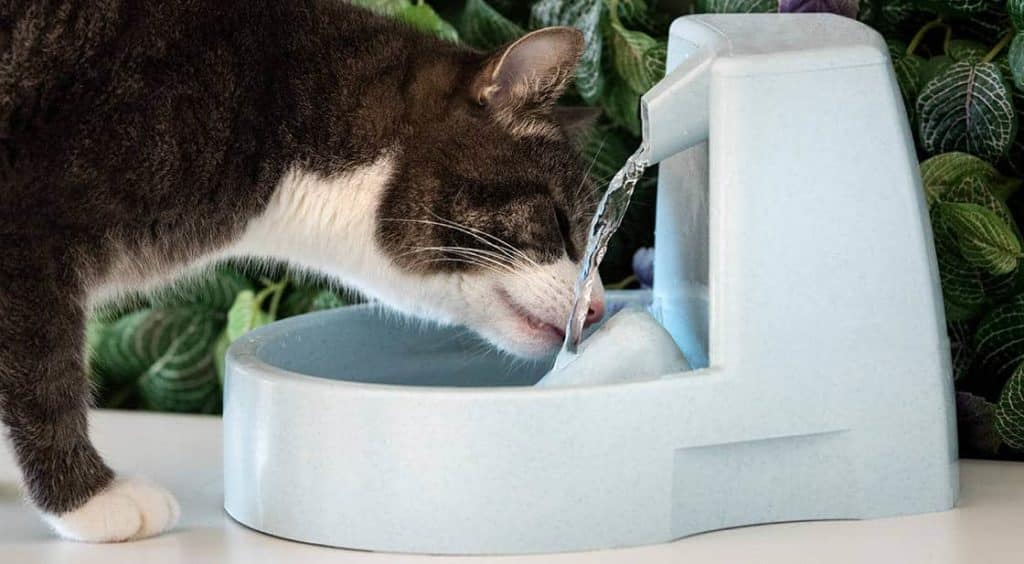
- Make sure litter trays are clean & comfortable
- Increase the number of litter trays
- Offer different types, or their favorite type, of litter
- Ensure pets are not bullying each other over the litter tray

Conclusion
The urinary system has many methods of fighting off infection, but if bacteria manage to break through its barriers, an infection can quickly spread along the tract. UTIs are common in cats and can be caused by numerous predisposing factors.
Carefully monitoring your cat’s normal urination patterns and bringing your cat to the vet when something changes is the best way of both preventing UTIs and catching them early.
Featured Image Credit: nanniezwawa, Shutterstock

